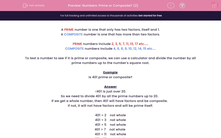A PRIME number is one that only has two factors, itself and 1.
A COMPOSITE number is one that has more than two factors.
PRIME numbers include 2, 3, 5, 7, 11, 13, 17 etc.....
COMPOSITE numbers include 4, 6, 8, 9, 10, 12, 14, 15 etc....
To test a number to see if it is prime or composite, we can use a calculator and divide the number by all prime numbers up to the number's square root.
Example
Is 401 prime or composite?
Answer
√401 is just over 20.
So we need to divide 401 by all the prime numbers up to 20.
If we get a whole number, then 401 will have factors and be composite.
If not, it will not have factors and will be prime itself.
401 ÷ 2 not whole
401 ÷ 3 not whole
401 ÷ 5 not whole
401 ÷ 7 not whole
401 ÷ 11 not whole
401 ÷ 13 not whole
401 ÷ 17 not whole
401 ÷ 19 not whole
401 is prime.
Want a bit more help with this before you begin? Why not watch this short video?








